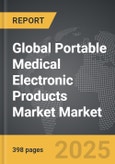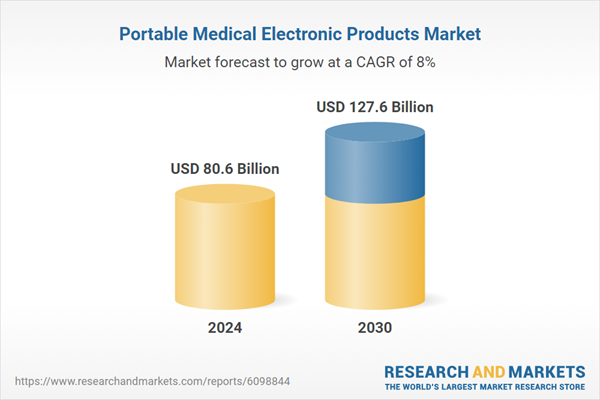Global “Portable Medical Electronic Products” Market - Key Trends & Drivers Summarized
Can Portability Reshape the Future of Healthcare Delivery?
Portable medical electronic products are revolutionizing how healthcare is accessed, delivered, and monitored across the globe. These devices - including portable ECG monitors, pulse oximeters, blood glucose meters, nebulizers, and portable ultrasound machines - are critical in decentralizing health services from hospitals to homes, ambulances, and field clinics. Driven by the need for continuous monitoring, especially among patients with chronic illnesses, these devices allow real-time data capture and remote diagnostics. The COVID-19 pandemic further accelerated adoption, as both patients and providers sought contactless, home-based solutions. Today, they serve a growing user base that includes the elderly, fitness-conscious individuals, and patients managing post-operative recovery. With their compact size, wireless capabilities, rechargeable batteries, and often app-based interfaces, these products empower users to take control of their health. Governments, particularly in emerging economies, are supporting portable diagnostic kits in rural outreach programs. Meanwhile, tech convergence is bridging the gap between consumer electronics and clinical-grade equipment, enabling multi-functionality in increasingly compact form factors. Portability is no longer a convenience - it's a clinical necessity reshaping modern medicine.How Are Global Markets Embracing Portable Medical Devices?
The global market for portable medical electronic products is expanding rapidly, backed by rising healthcare awareness, technological penetration, and chronic disease prevalence. According to market estimates, the sector is set to grow at a CAGR exceeding 9% through 2030, with cardiovascular, respiratory, and diabetic conditions driving most of the demand. North America remains a major market due to its aging population and advanced healthcare infrastructure. However, Asia-Pacific is emerging as the fastest-growing region, bolstered by mobile healthcare initiatives and increased public-private partnerships. Rural health access programs in India, China, and Southeast Asia increasingly rely on portable diagnostics. Europe's focus on preventative care and decentralized services also contributes to adoption. Furthermore, insurance reimbursement structures and telemedicine integration are playing crucial roles in legitimizing and funding these devices. With governments and NGOs distributing portable kits for maternal health, pandemic surveillance, and disaster relief, the reach of these products continues to grow. Hospitals and diagnostic chains are investing in mobile health units that rely on these compact devices to expand access without expanding infrastructure.What Technological Innovations Are Reshaping Portable Healthcare Devices?
Technology has dramatically enhanced the capability and reliability of portable medical electronic products. Advances in microelectronics and sensor miniaturization have allowed critical diagnostic functions to fit into handheld or wearable devices. AI integration is making these products smarter - from arrhythmia detection in portable ECGs to oxygen saturation trend analysis in smart oximeters. Connectivity via Bluetooth, Wi-Fi, and even 5G enables real-time data syncing with cloud-based platforms, supporting remote consultations and longitudinal tracking. Battery efficiency has improved, with devices now offering multi-day usage on a single charge. Touchscreen displays, voice interfaces, and multilingual support enhance usability for non-technical users. Portable imaging devices - like handheld ultrasound scanners - now utilize AI-guided imaging for better diagnostics by general practitioners and emergency responders. Security enhancements ensure compliance with HIPAA and GDPR for health data protection. Moreover, modular systems are enabling multi-diagnostic functionalities in a single unit, appealing to rural clinics and emergency response units. These innovations are not only elevating healthcare standards but also lowering systemic costs by enabling early interventions and reducing hospital admissions.The Growth in the Portable Medical Electronic Products Market Is Driven by Several Factors…
The growth in the portable medical electronic products market is driven by a complex interplay of healthcare demand patterns, technological enhancements, and evolving delivery models. The rising incidence of chronic diseases like diabetes, hypertension, and COPD has fueled demand for continuous home-based monitoring solutions. The global shift toward preventive healthcare - backed by policy and insurance coverage - has reinforced the relevance of portable diagnostics. Consumer behavior is favoring autonomy, as people increasingly use wearables and compact health tech for self-assessment and fitness management. In clinical settings, hospitals are deploying portable monitors to increase ICU capacity or enable mobile triage. Telemedicine platforms are integrating portable diagnostic devices as part of virtual consultation kits, creating new use cases. Technological advancements in sensors, batteries, AI-driven diagnostics, and mobile connectivity are ensuring higher accuracy and convenience. Market expansion is further supported by healthcare digitization initiatives in emerging markets and global investments in mobile medical units. These devices are not just tools for monitoring; they're engines driving a healthcare shift from institutionalized care to personalized, connected, and portable care environments.Report Scope
The report analyzes the Portable Medical Electronic Products market, presented in terms of market value (US$). The analysis covers the key segments and geographic regions outlined below:- Segments: Products (Diagnostic Imaging, Monitoring Devices, Other Products); Application (Gynecology, Cardiology, Gastrointestinal, Urology, Neurology, Respiratory, Orthopedics, Other Applications); End-User (Hospitals, Physician Offices, Homecare Settings, Other End-Users).
- Geographic Regions/Countries: World; United States; Canada; Japan; China; Europe (France; Germany; Italy; United Kingdom; Spain; Russia; and Rest of Europe); Asia-Pacific (Australia; India; South Korea; and Rest of Asia-Pacific); Latin America (Argentina; Brazil; Mexico; and Rest of Latin America); Middle East (Iran; Israel; Saudi Arabia; United Arab Emirates; and Rest of Middle East); and Africa.
Key Insights:
- Market Growth: Understand the significant growth trajectory of the Diagnostic Imaging segment, which is expected to reach US$64.4 Billion by 2030 with a CAGR of a 6.3%. The Monitoring Devices segment is also set to grow at 10.2% CAGR over the analysis period.
- Regional Analysis: Gain insights into the U.S. market, valued at $22 Billion in 2024, and China, forecasted to grow at an impressive 12.1% CAGR to reach $26.9 Billion by 2030. Discover growth trends in other key regions, including Japan, Canada, Germany, and the Asia-Pacific.
Why You Should Buy This Report:
- Detailed Market Analysis: Access a thorough analysis of the Global Portable Medical Electronic Products Market, covering all major geographic regions and market segments.
- Competitive Insights: Get an overview of the competitive landscape, including the market presence of major players across different geographies.
- Future Trends and Drivers: Understand the key trends and drivers shaping the future of the Global Portable Medical Electronic Products Market.
- Actionable Insights: Benefit from actionable insights that can help you identify new revenue opportunities and make strategic business decisions.
Key Questions Answered:
- How is the Global Portable Medical Electronic Products Market expected to evolve by 2030?
- What are the main drivers and restraints affecting the market?
- Which market segments will grow the most over the forecast period?
- How will market shares for different regions and segments change by 2030?
- Who are the leading players in the market, and what are their prospects?
Report Features:
- Comprehensive Market Data: Independent analysis of annual sales and market forecasts in US$ Million from 2024 to 2030.
- In-Depth Regional Analysis: Detailed insights into key markets, including the U.S., China, Japan, Canada, Europe, Asia-Pacific, Latin America, Middle East, and Africa.
- Company Profiles: Coverage of players such as BELLA Housewares, Bilaca Electric Co., Ltd., BlendJet Inc., Blufied Limited, Bosch Home Appliances and more.
- Complimentary Updates: Receive free report updates for one year to keep you informed of the latest market developments.
Some of the 47 companies featured in this Portable Medical Electronic Products market report include:
- Abbott Laboratories
- AliveCor, Inc.
- B. Braun Melsungen AG
- Becton, Dickinson and Company
- Bio-Rad Laboratories, Inc.
- Boston Scientific Corporation
- CareFusion Corporation
- Dexcom, Inc.
- GE Healthcare
- Getinge AB
- Hologic, Inc.
- Johnson & Johnson
- Masimo Corporation
- Medtronic plc
- Natus Medical Incorporated
- Omron Healthcare, Inc.
- Philips Healthcare
- ResMed Inc.
- Siemens Healthineers AG
- Terumo Corporation
This edition integrates the latest global trade and economic shifts into comprehensive market analysis. Key updates include:
- Tariff and Trade Impact: Insights into global tariff negotiations across 180+ countries, with analysis of supply chain turbulence, sourcing disruptions, and geographic realignment. Special focus on 2025 as a pivotal year for trade tensions, including updated perspectives on the Trump-era tariffs.
- Adjusted Forecasts and Analytics: Revised global and regional market forecasts through 2030, incorporating tariff effects, economic uncertainty, and structural changes in globalization. Includes historical analysis from 2015 to 2023.
- Strategic Market Dynamics: Evaluation of revised market prospects, regional outlooks, and key economic indicators such as population and urbanization trends.
- Innovation & Technology Trends: Latest developments in product and process innovation, emerging technologies, and key industry drivers shaping the competitive landscape.
- Competitive Intelligence: Updated global market share estimates for 2025, competitive positioning of major players (Strong/Active/Niche/Trivial), and refined focus on leading global brands and core players.
- Expert Insight & Commentary: Strategic analysis from economists, trade experts, and domain specialists to contextualize market shifts and identify emerging opportunities.
Table of Contents
Companies Mentioned (Partial List)
A selection of companies mentioned in this report includes, but is not limited to:
- Abbott Laboratories
- AliveCor, Inc.
- B. Braun Melsungen AG
- Becton, Dickinson and Company
- Bio-Rad Laboratories, Inc.
- Boston Scientific Corporation
- CareFusion Corporation
- Dexcom, Inc.
- GE Healthcare
- Getinge AB
- Hologic, Inc.
- Johnson & Johnson
- Masimo Corporation
- Medtronic plc
- Natus Medical Incorporated
- Omron Healthcare, Inc.
- Philips Healthcare
- ResMed Inc.
- Siemens Healthineers AG
- Terumo Corporation
Table Information
| Report Attribute | Details |
|---|---|
| No. of Pages | 398 |
| Published | February 2026 |
| Forecast Period | 2024 - 2030 |
| Estimated Market Value ( USD | $ 80.6 Billion |
| Forecasted Market Value ( USD | $ 127.6 Billion |
| Compound Annual Growth Rate | 8.0% |
| Regions Covered | Global |









